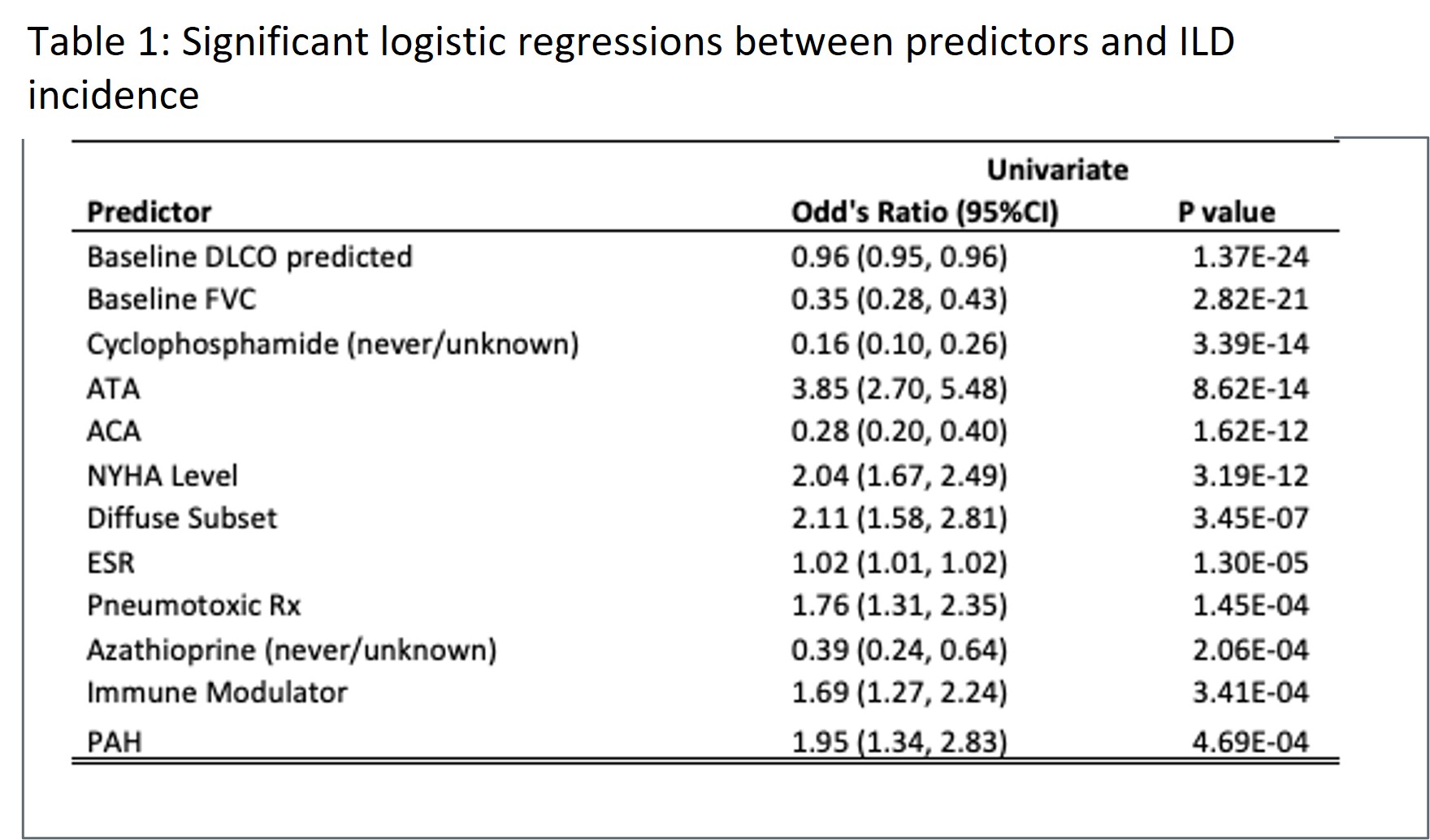Session Information
Date: Saturday, November 6, 2021
Title: Systemic Sclerosis & Related Disorders – Clinical Poster I (0387–0413)
Session Type: Poster Session A
Session Time: 8:30AM-10:30AM
Background/Purpose: In patients with SSc, interstitial lung disease (SSc-ILD) and pulmonary hypertension affect 50-70% of patients and are the leading cause of death. Recent trials in anti-fibrotic medications have shown promise in reducing rates of lung function decline in patients with SSc-ILD. Identifying SSc-ILD development and initiating therapy early is essential to optimizing therapeutic benefit. We aimed to identify predictors of SSc-ILD and compared early (< 5 years from SSc diagnosis) versus late onset to aid in optimizing targeted screening for SSc-ILD.
Methods: We analyzed data from the Canadian Scleroderma Research Group (CSRG) patient registry. Patients ≥18 years with follow-up until July 2019 were included. Logistic regression modelling by ordinary least squares and forward stepwise regression were run to identify patient factors associated with SSc-ILD development as well as its early onset (< 5 years from SSc diagnosis). Factors associated with incident ILD were determined as were factors associated with early versus late onset using all patients who developed SSc-ILD during follow-up. Bonferroni correction was utilized to limit Type 1 errors.
Results: Of 1695 patients followed between August 2004 and July 2019, 417 developed SSc-ILD; 227 were incident diagnoses after registry entry. Patients were predominantly middle-aged Caucasian females. General risk factors for ILD including family history, environmental exposures and smoking histories were overall low prevalence in the population and similar between those that did and did not develop SSc-ILD.
Logistic regression identified 12 patient factors associated with increased or decreased odds of developing ILD independent of age and sex (Table 1). Forward stepwise selection revealed 6 significant predictors of SSc-ILD development (Figure 1). Age at SSc diagnosis was the only predictor of early-onset SSc-ILD with older age at SSc diagnosis being associated with increased odds of SSc-ILD onset before 5 years (Table 2).
Conclusion: In a large Canadian cohort we identified 6 factors significantly associated with risk of developing SSc-ILD: baseline pulmonary function (with higher baseline DLCO and FVC reducing risk), antibody status (ATA positivity increasing risk, ACA positivity decreasing risk), elevated hemoglobin and older age at Raynaud’s onset. Only older age at SSc diagnosis was predictive of early-onset SSc-ILD .
To cite this abstract in AMA style:
Kapralik J, Morton R, Farooqi M, Beattie K, Hambly N, Larche M. Predictors of ILD Development and Timing of Onset in Systemic Sclerosis: A Canadian Cohort [abstract]. Arthritis Rheumatol. 2021; 73 (suppl 9). https://acrabstracts.org/abstract/predictors-of-ild-development-and-timing-of-onset-in-systemic-sclerosis-a-canadian-cohort/. Accessed .« Back to ACR Convergence 2021
ACR Meeting Abstracts - https://acrabstracts.org/abstract/predictors-of-ild-development-and-timing-of-onset-in-systemic-sclerosis-a-canadian-cohort/



